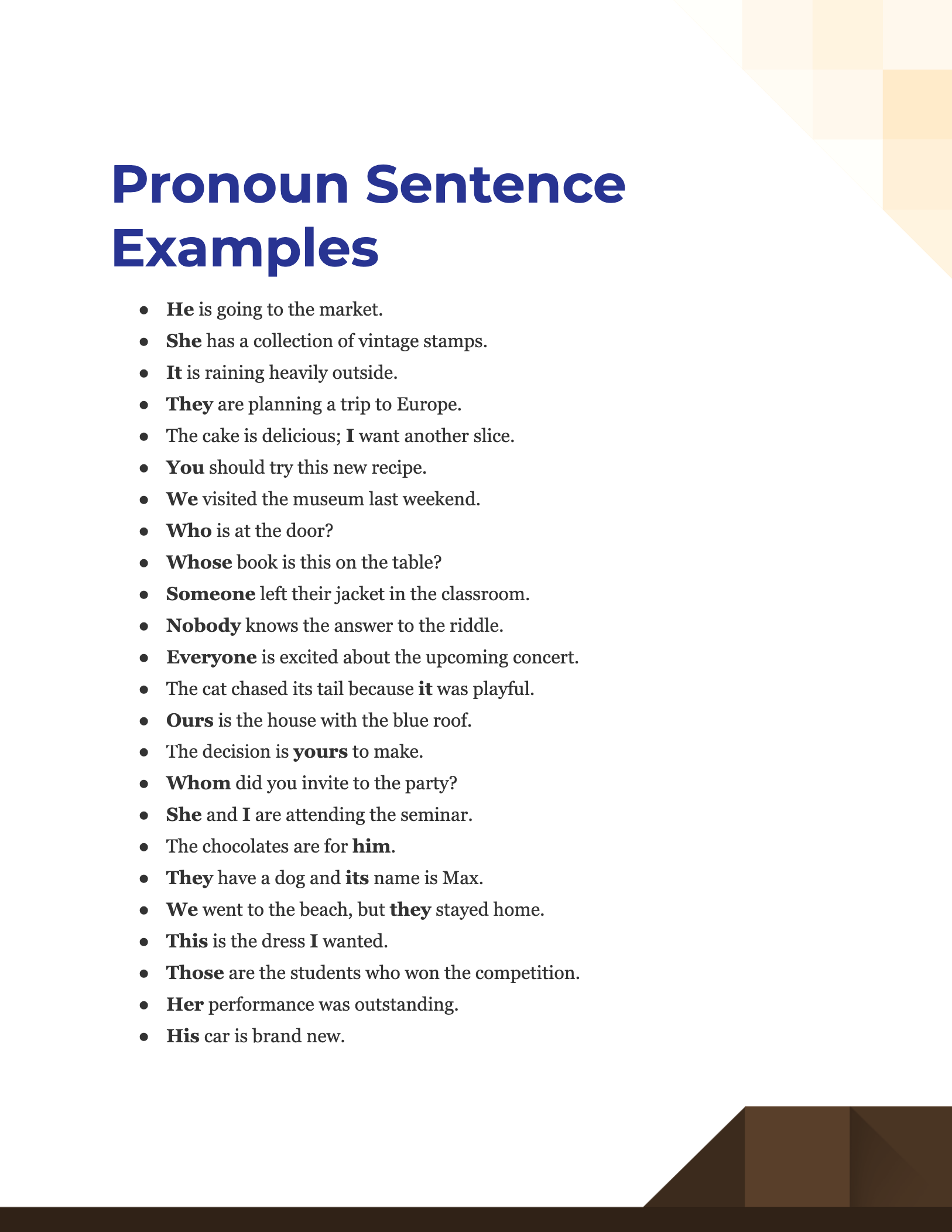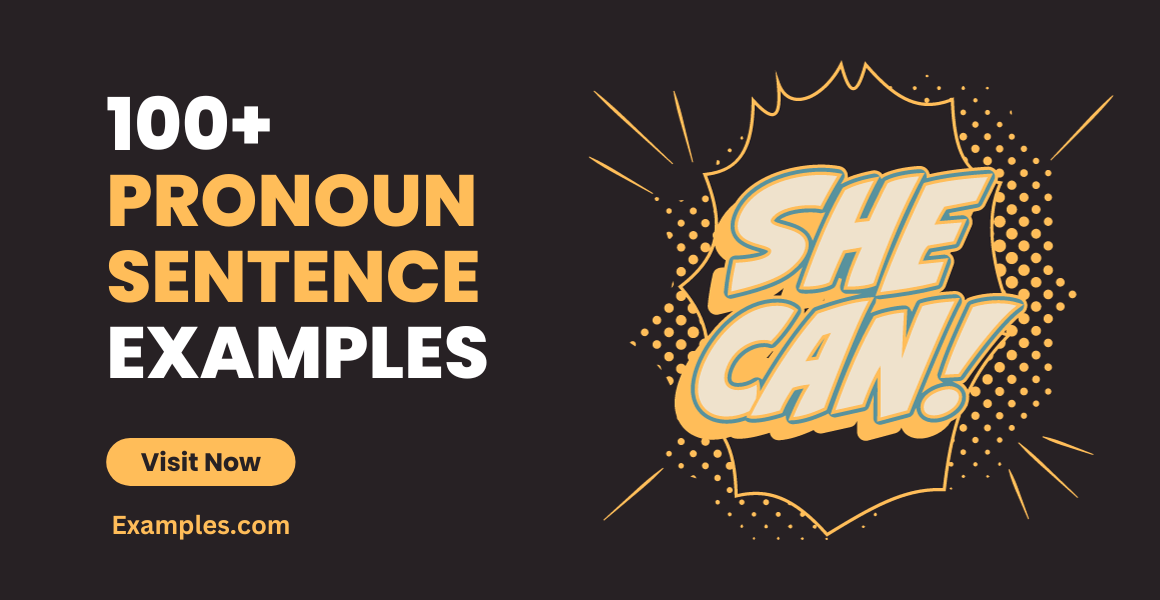99+ Pronoun Sentence Examples
Delve into the captivating world of pronouns, a fundamental pillar of English grammar. This extensive guide illuminates the art of constructing impeccable Pronoun Sentence Examples. Perfect for learners and seasoned writers alike, discover how integrating pronouns can refine your sentences, making them more engaging and reader-friendly. Equip yourself with invaluable writing tips to elevate your prose to new heights.
What is the Pronoun Sentence? – Definition
A pronoun sentence is a statement in which a pronoun (a word that takes the place of a noun) is used to convey a clear meaning. Instead of repeating the same noun, pronouns like “he,” “she,” “it,” “they,” etc., are utilized to enhance sentence fluidity and avoid redundancy.
What is the best Example of a Pronoun Sentence?
Consider the sentence: “Sarah is an artist, and she loves painting landscapes.” Here, “she” is the pronoun replacing the noun “Sarah,” making the sentence more concise and less repetitive. Using the pronoun streamlines the sentence, demonstrating the value and efficiency of pronouns in everyday language.
100 Pronouns in Sentence Examples

Pronouns are quintessential linguistic elements that replace nouns to prevent repetitive and monotonous prose. These handy words provide clarity, succinctness, and enhance the fluidity of our sentences. Embark on this illustrative journey through the realm of pronouns, where we’ll present a gamut of sentences showcasing these versatile words in action. Whether you’re an English learner or a seasoned writer, these examples will enhance your understanding and utilization of pronouns in everyday communication.
- He is going to the market.
- She has a collection of vintage stamps.
- It is raining heavily outside.
- They are planning a trip to Europe.
- The cake is delicious; I want another slice.
- You should try this new recipe.
- We visited the museum last weekend.
- Who is at the door?
- Whose book is this on the table?
- Someone left their jacket in the classroom.
- Nobody knows the answer to the riddle.
- Everyone is excited about the upcoming concert.
- The cat chased its tail because it was playful.
- Ours is the house with the blue roof.
- The decision is yours to make.
- Whom did you invite to the party?
- She and I are attending the seminar.
- The chocolates are for him.
- They have a dog and its name is Max.
- We went to the beach, but they stayed home.
- This is the dress I wanted.
- Those are the students who won the competition.
- Her performance was outstanding.
- His car is brand new.
- Its color is quite unique.
- You and he are in the same team.
- Someone needs to claim their lost wallet.
- None of the students were absent.
- Which is the right path to take?
- These are the books I recommended.
- What are you doing this weekend?
- Whichever route you take, you’ll reach the destination.
- Their plan sounds interesting.
- Mine is the red bicycle.
- Neither of them is to blame.
- Both the options are viable.
- Some of the cookies have chocolate chips.
- Each of the participants gets a medal.
- One should always respect their elders.
- Another opportunity will come your way.
- That is exactly what I meant.
- Such was her charisma that everyone was drawn to her.
- Whoever finishes first will get a prize.
- Yourself and Peter are in charge of the decorations.
- They gave themselves a break after the hard work.
- Anything is possible if you believe.
- Everything is going according to plan.
- Nothing can stop us now.
- She is as talented as he is.
- Few of the students have submitted their assignments.
- Many are called, but few are chosen.
- All are welcome to the event.
- Somebody called for you.
- Anybody can participate in the contest.
- Neither John nor I am responsible.
- Either path leads to the castle.
- Both Sarah and I are from New York.
- Myself and James will handle the project.
- You need to believe in yourself.
- They enjoyed themselves at the party.
- The gift is for you and me.
- Whomever you choose will be fine with us.
- Who is responsible for this?
- Whose idea was this?
- She was the one who solved the mystery.
- Any of these shirts will look good on you.
- Such incidents should be reported.
- He is the one who deserves the award.
- Which of these dresses do you like?
- That was a close call, wasn’t it?
- Someone like him is hard to find.
- Whoever brought these cookies, thank you!
- Everything is prepared for the party.
- None of the guests arrived on time.
- Neither the car nor the bike is mine.
- Everybody had a great time at the concert.
- Whichever option you choose, stick with it.
- Myself and Jane completed the project ahead of time.
- They ought to finish the assignment themselves.
- Somebody must have taken my umbrella.
- Anybody can participate in the race.
- Neither Sarah nor I know the answer.
- Both options have their advantages.
- All are welcome to join the club.
- Everybody is excited about the upcoming event.
- Nothing can ruin our plans.
- She sings as beautifully as he does.
- Few students have submitted their essays.
- Many attended the seminar.
- One should always be kind to others.
- Another day, another opportunity.
- That is the same dress I wore.
- Such dedication leads to success.
- Whoever arrives first can choose the seats.
- Yourself and Mark can handle the presentation.
- They gave themselves a well-deserved break.
- Anything is possible with determination.
- Everything is under control.
- Nobody likes to be late.
- Many enjoyed the movie, while others found it boring.
These sentences demonstrate the versatile usage of pronouns, showcasing their ability to replace nouns and create clear, concise, and engaging communication. Whether you’re writing an essay, conversing with friends, or crafting a story, pronouns play an essential role in language, making communication more efficient and enjoyable.
How do you write a Pronoun Sentence? – Step by Step Guide
Writing pronoun sentences is a fundamental skill in English grammar. Follow these steps to create effective pronoun sentences:
- Identify the Antecedent: Determine the noun or noun phrase that the pronoun will replace. This is known as the antecedent.
- Choose the Appropriate Pronoun: Select the pronoun that agrees in gender, number, and person with the antecedent. Common pronouns include he, she, it, they, we, and you.
- Place the Pronoun in the Sentence: Replace the antecedent with the chosen pronoun while ensuring the sentence remains clear and coherent.
- Ensure Agreement: Check that the pronoun agrees in gender, number, and person with the antecedent. For example, if the antecedent is singular and masculine, use “he” as the pronoun.
- Revise for Clarity: Review the sentence to ensure it is clear and conveys the intended meaning. Pronoun sentences should not cause confusion.
- Avoid Ambiguity: Be cautious about using pronouns when multiple antecedents are present. Make sure it’s clear which noun the pronoun refers to.
- Practice Proper Pronoun Usage: Practice writing pronoun sentences to reinforce your understanding of pronoun-antecedent agreement.
Tips for Using Pronoun Sentences
Here are some tips to effectively use pronoun sentences in your writing:
- Maintain Clarity: Pronoun sentences should not lead to ambiguity. Ensure that the antecedent is clear and that the pronoun’s reference is unambiguous.
- Vary Pronouns: Use a variety of pronouns to add variety and interest to your writing. Avoid overusing the same pronoun repeatedly.
- Agree in Number and Gender: Pay attention to the number (singular/plural) and gender (masculine/feminine/neutral) of the antecedent to select the appropriate pronoun.
- Avoid Pronoun Shift: Maintain consistency in pronoun usage within a sentence or paragraph. Avoid shifting from one pronoun to another without a clear reason.
- Proofread Carefully: Check your writing for errors in pronoun-antecedent agreement during the proofreading process.
- Consider Context: Consider the context of your writing and the formality of the document. Formal writing may require more precise pronoun usage.
- Use Pronouns for Conciseness: Pronouns can make sentences more concise by replacing repeated nouns.
By following these steps and tips, you can effectively write and use pronoun sentences in your writing, enhancing clarity and readability.



